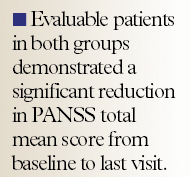- Safety & Recalls
- Regulatory Updates
- Drug Coverage
- COPD
- Cardiovascular
- Obstetrics-Gynecology & Women's Health
- Ophthalmology
- Clinical Pharmacology
- Pediatrics
- Urology
- Pharmacy
- Idiopathic Pulmonary Fibrosis
- Diabetes and Endocrinology
- Allergy, Immunology, and ENT
- Musculoskeletal/Rheumatology
- Respiratory
- Psychiatry and Behavioral Health
- Dermatology
- Oncology
Ziprasidone and risperidone equally efficacious for treatment of acute exacerbation of schizophrenia or schizoaffective disorder
Ziprasidone (Geodon, Pfizer) and risperidone (Risperdal, Janssen) are equally efficacious in the treatment of patients with acute exacerbation of schizophrenia and schizoaffective disorder, with ziprasidone demonstrating a lower movement disorder burden and less effect on prolactin concentrations and weight than risperidone.
Ziprasidone (Geodon, Pfizer) and risperidone (Risperdal, Janssen) are equally efficacious in the treatment of patients with acute exacerbation of schizophrenia and schizoaffective disorder, with ziprasidone demonstrating a lower movement disorder burden and less effect on prolactin concentrations and weight than risperidone.
In a randomized, double-blind, multicenter, parallel-group study, researchers assigned 296 patients with a DSM-III-R acute exacerbation of schizophrenia or schizoaffective disorder to ziprasidone 40 to 80 mg bid (n=149) or risperidone 3 to 5 mg bid (n=147) for 8 weeks to measure efficacy and safety levels.
At Week 1, patients were treated with ziprasidone 40 mg bid, with treatment adjusted weekly thereafter in 20-mg bid increments, keeping within a range of 80 to 160 mg/d. Risperidone was titrated from 1 mg bid (Day 1) to 3 mg bid (Days 3 to 7) during Week 1, and then adjusted at weekly intervals in 1-mg increments to a maximum of 5 mg bid. Over the August 1995 to January 1997 study period, approximately 37% and 29% of the ziprasidone and risperidone groups, respectively, discontinued treatment.

The mean Movement Disorder Burden (MDB) score was significantly higher for risperidone- than for ziprasidone-treated patients (0.35 vs 0.20; P=.015). More patients experienced a movement disorder adverse event in the risperidone group (54, 36.7%) than in the ziprasidone group (44, 29.5%).
Treatment-related adverse events occurred in 87 (58.4%) and 92 (62.6%) ziprasidone- and risperidone-treated patients, respectively. Adverse events rates identified in ≥10% of patients were similar between groups, except for a higher rate of insomnia in the ziprasidone group and akathisia in the risperidone group.
Serum prolactin concentration elevations were more consistent in both men and women taking risperidone (men, 38.1 ng/mL; women, 81.7 ng/mL) than in those taking ziprasidone (men, 14.0 ng/mL; women, 23.2 ng/mL). Although no relevant changes in vital signs from baseline in median values were observed in either group, 7 patients (4 risperidone, 3 ziprasidone) at last observation experienced irregularities.
Ziprasidone demonstrated a less clinically important effect on weight (8.2% experienced weight increase, 7.4% experienced weight decrease) than with risperidone (16.0% experienced weight increase, 2.4% experienced weight decrease).
SOURCE Addington DE, Pantelis C, Dineen M, Benattia I, Romano SJ. Efficacy and tolerability of ziprasidone versus risperidone in patients with acute exacerbation of schizophrenia or schizoaffective disorder: an 8-week, double-blind, multicenter trial. J Clin Psychiatry. 2004;65:1624-1633.
Coalition promotes important acetaminophen dosing reminders
November 18th 2014It may come as a surprise that each year Americans catch approximately 1 billion colds, and the Centers for Disease Control and Prevention estimates that as many as 20% get the flu. This cold and flu season, 7 in 10 patients will reach for an over-the-counter (OTC) medicine to treat their coughs, stuffy noses, and sniffles. It’s an important time of the year to remind patients to double check their medicine labels so they don’t double up on medicines containing acetaminophen.
Support consumer access to specialty medications through value-based insurance design
June 30th 2014The driving force behind consumer cost-sharing provisions for specialty medications is the acquisition cost and not clinical value. This appears to be true for almost all public and private health plans, says a new report from researchers at the University of Michigan Center for Value-Based Insurance Design (V-BID Center) and the National Pharmaceutical Council (NPC).
Management of antipsychotic medication polypharmacy
June 13th 2013Within our healthcare-driven society, the increase in the identification and diagnosis of mental illnesses has led to a proportional increase in the prescribing of psychotropic medications. The prevalence of mental illnesses and subsequent treatment approaches may employ monotherapy as first-line treatment, but in many cases the use of combination of therapy can occur, leading to polypharmacy.1 Polypharmacy can be defined in several ways but it generally recognized as the use of multiple medications by one patient and the most common definition is the concurrent use of five more medications. The presence of polyharmacy has the potential to contribute to non-compliance, drug-drug interactions, medication errors, adverse events, or poor quality of life.
Medical innovation improves outcomes
June 12th 2013I have been diagnosed with stage 4 cancer of the pancreas, a disease that’s long been considered not just incurable, but almost impossible to treat-a recalcitrant disease that some practitioners feel has given oncology a bad name. I was told my life would be measured in weeks.
